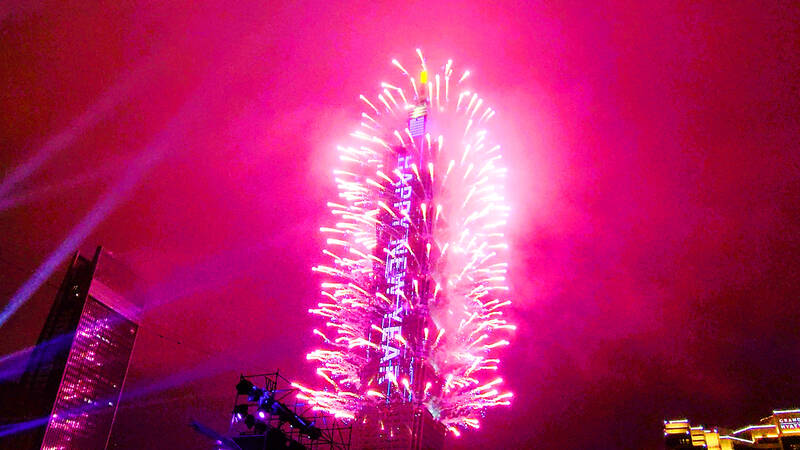對話 Dialogue
清清:你今晚還要去臺北101看跨年煙火嗎?
Qīngqing: Nǐ jīnwǎn hái yào qù Táiběi Yī líng yī kàn kuànián yānhuǒ ma?

Photo: Wikimedia Commons / 照片:Wikimedia Commons 提供
華華:已經連看了好幾年,今年不想去了。
Huáhua: Yǐjīng lián kànle hǎojǐ nián, jīnnián bùxiǎng qùle.
清清:那你打算怎麼跨年?
Qīngqing: Nà nǐ dǎsuàn zěnme kuànián?
華華:還在考慮要不要去看跨年演唱會,不少縣市政府都安排了。
Huáhua: Hái zài kǎolǜ yào búyào qù kàn kuànián yǎnchàng huì, bùshǎo xiànshì zhèngfǔ dōu ānpái le.
清清:不管是煙火還是演唱會,都是人山人海,想參加就要早點出門。
Qīngqing: Bùguǎn shì yānhuǒ háishì yǎnchàng huì, dōu shì rénshān rénhǎi, xiǎng cānjiā jiù yào zǎodiǎn chūmén.
華華:這也是我在想的問題,有點不想去人擠人了,在家舒舒服服地看轉播倒數也不錯。
Huáhua: Zhè yěshì wǒ zài xiǎng de wèntí, yǒudiǎn bùxiǎng qù rénjǐrén le, zàijiā shū shūfúfú de kàn zhuǎnbò dàoshǔ yě búcuò.
清清:聽起來怎麼好像要老的不只一歲?完全沒有年輕人的熱血了!
Qīngqing: Tīng qǐlái zěnme hǎoxiàng yào lǎo de bùzhǐ yí suì? Wánquán méiyǒu niánqīng rén de rèxiě le!
華華:我只是最近很忙,就懶得去了。無論如何,祝你新年快樂啦!
Huáhua: Wǒ zhǐshì zuìjìn hěn máng, wǒ lǎndeqù le. Wúlùn rúhé, zhù nǐ xīnnián kuàilè la!
翻譯 Translation
Qingqing: Are you still going to Taipei 101 to watch the New Year’s fireworks tonight?
Huahua: I’ve gone for several years in a row, but I don’t want to go this year.
Qingqing: Then how do you plan to spend New Year’s Eve?
Huahua: I’m still considering whether to go to a New Year’s concert; quite a few county and city governments have arranged them.
Qingqing: Whether it’s fireworks or a concert, it’s always crowded. If you want to go, you have to leave early.
Huahua: That’s also what I’m thinking; I’m a bit tired of the crowds. Watching the live broadcast and countdown from the comfort of home sounds nice too.
Qingqing: Sounds like you’re getting old. You’ve totally lost your youthful enthusiasm.
Huahua: I’m just really busy lately, so I’m too lazy to go. Anyway, Happy New Year to you.
生詞 Vocabulary
1. 跨年 (kuànián) New Year’s Eve, seeing the new year in
2. 煙火 (yānhuǒ) fireworks
3. 縣市政府 (xiànshì zhèngfǔ) county and city government
4. 人山人海 (rénshān rénhǎi) [idiom] a sea of people, crowded
5. 人擠人 (rénjǐrén) crowded, people packed together
6. 倒數 (dàoshǔ) countdown
7. 熱血 (rèxiě) enthusiastic, passionate
8.懶 (lǎn) lazy
教材音檔 Audio Files
國立清華大學華語中心提供
By National Tsing Hua University Chinese Language Center:

A: Guess what’s included in Google Taiwan’s 2024 most searched words. B: Let me guess: Taiwan’s victory in the WBSC Premier 12 championship must be on the list. A: Wow, good guess. “Premier 12” is at No. 10. B: What are the other most popular searches? A: No. 9 to 6 are: Ticketing platform “Tixcraft,” Taiwanese film “The Pig, The Snake and The Pigeon,” Olympic gold boxer “Lin Yu-ting,” and the “Yuanta ETF coded 00940.” A: 猜猜看,Google 2024台灣搜尋排行榜,有哪些關鍵詞? B: 我猜「棒球12強賽」一定超熱門吧。 A: 你好強,12強真的排在第10名! B: 其他熱門搜尋有哪些?! A: 第9至6名是︰「拓元」售票、電影「周處除三害」、奧運拳擊金牌「林郁婷」、元大ETF「00940」。 (By Eddy Chang, Taipei Times/台北時報張聖恩)

A: Which words ranked highest for Google Taiwan’s most searched words of 2024? B: No. 5 to 1 are: “US presidential election,” “Olympics,” “Ko Wen-je,” “typhoon” and “earthquake.” A: I heard that Google also released a list of most searched word meanings. B: Yeah, the most popular searches included “M3,” “APT” and “release without bail.” A: Let me google their meanings now. A: Google 2024 台灣搜尋排行榜,前幾名是什麼? B: 第5至1名是︰「美國總統大選」、「奧運」、「柯文哲」、「颱風」、「地震」! A: 我聽說Google還有一個搜尋字義的排行榜。 B: 對啊前幾名是︰「M3」、「APT」、「無保請回」。 A: 讓我搜尋一下他們是什麼意思。 (By Eddy Chang, Taipei Times/台北時報張聖恩)

Stonefish may not be the most impressive-looking animal in the sea. In fact, this fish is so skilled at camouflage that most people wouldn’t notice it if they swam past it. Despite their unremarkable appearance, stonefish are the most venomous fish in the ocean. Stonefish come in various shades of brown, red, yellow, and orange. Their rough skin texture and blotchy color pattern give them a remarkable resemblance to stones, which is where their name comes from. This feature helps them blend in with their surroundings exceptionally well. Stonefish are notable for their 13 highly venomous spines which protrude

「雙手合十/合掌禮」(namaste) or 「碰肘/擊肘」 (elbow bump): 新冠肺炎流行逐漸改變現代社會的某些社交禮儀,歐美許多名人政要開始以「雙手合十/合掌禮」(namaste) 或「碰肘/擊肘」(elbow bump) 替代握手。 《今日商業》報導英國王儲查爾斯以「雙手合十」代替握手。 Coronavirus update: Prince Charles spotted greeting people with namaste (Business Today , March 12, 2020) 另外,《商業內幕》報導:疫情期間美國總統川普在白宮舉行新冠肺炎記者會,想和居家照護公司LHC集團執行副總葛林斯坦 (Bruce Greenstein) 握手,葛林斯坦婉拒,示意改用擊肘。 President Donald Trump attempted to shake hands with a home health care company executive . . . but the man turned the president down and offered him an elbow bump instead. (Eliza Relman, Business Insider , March 14, 2020) 「雙手合十/合掌禮」源自印度,也流行於泰、緬等國家。「碰肘/擊肘」則是 2006 禽流感、2009 豬流感後逐漸流行。疫情逐漸改變我們的生活方式,包括打招呼等社交禮儀,也出現了微妙的變化。 「拱手禮」(fist-and-palm salute) 至於華人社會傳統上也有雙手互握合於胸前「拱手禮」(fist-and-palm salute)。公益網站 Just Quarantine 提到: Taiwanese president Tsai Ing-wen demonstrating social distancing through use of a traditional Chinese greeting (fist & palm) instead of shaking hands in response to the COVID-19 pandemic. 因應新冠肺炎疫情,2020 當年總統蔡英文與來訪賓客保持安全距離,拱手 (fist &